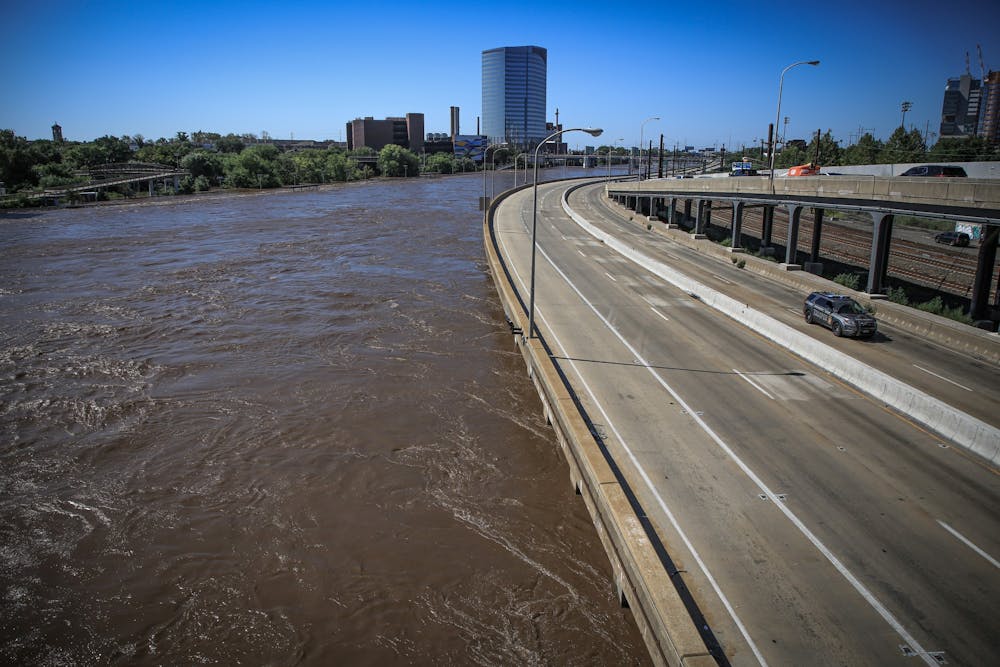
Remnants from Hurricane Ida brought severe flooding to Philadelphia on Sept. 2, causing the Schuylkill River to overflow.
Credit: Jesse ZhangPenn experts on climate action, some of whom contributed to the groundbreaking Intergovernmental Panel on Climate Change published this summer, are emphasizing the urgency of climate action and reaching net-zero carbon emissions, particularly after the recent severe flooding and tornadoes that tore through Philadelphia.
The first of three installments of the IPCC’s sixth assessment report was released on Aug. 9, with the remaining two installments anticipated to release in 2022. Michael Weisberg, chair of the department of Philosophy and director of post-graduate programs at Perry World House, will be a contributing author to the report’s second installment. The IPCC was created by the United Nations in 1988 in efforts to form a global scientific body responsible for providing comprehensive climate and mitigation reports, which are usually published every few years. The last physical report was published in 2013.
This year's report drew from over 14,000 peer-reviewed scientific studies on the physical science of climate change, which United Nations Secretary General António Guterres called a “code red for humanity.” A key takeaway from the IPCC report is that human influence has unequivocally warmed Earth's atmosphere, oceans, and land.
The report writes that temperatures have risen the most in the last half century in over 100,000 years, with the last five years being the hottest on record since 1850. Anthropogenic activity has also accelerated sea level rise and sea-ice retreat according to the report, and has intensified heat waves. The report also voids any pathways of keeping global warming to the 1.5°C threshold scientists had once aimed for.
Weisberg said this year’s report “made the strongest statements ever about that the climate is changing, that humans are the cause of it.” He added that the report may be the “greatest expression” of international scientific collaboration.
“With kind of startling urgency for an IPCC document, they basically say it's virtually impossible for us to avoid the 1.5°C threshold,” Mark Hughes, director of Penn’s Kleinman Center for Energy Policy, said. Already at 1.2°C above pre-industrial levels, Hughes predicted the Earth will cross 1.5°C within the next two decades, setting a new goal of remaining below 2°C.
"The cause of that warming is human activity," Hughes said.
Howard Kunreuther, a professor in The Wharton School who also serves as co-director of Wharton’s Risk Management and Decision Processes Center, identified three major takeaways from the report. First, he said humans are witnessing climate change and carbon emissions creating more serious problems than anyone had anticipated even one or two years ago. Second, he advised students, organizations, and countries to take advantage of the fact that we are now experiencing these events, in hopes of finally addressing biases and heuristics that prevent people from taking action against climate change.
Finally, Kunreuther emphasized that both the government and public-private partnerships must involve individuals, organizations, and countries in developing strategies to take action.
“We can’t wait another five or 10 years to get these measures in place. We have to do something now,” Kunreuther said. The United Nations’ annual Climate Change Conference this November, called COP 26, will be an important phase to implement the report’s recommendations, he said.
The revelations published in this year's IPCC report are substantial compared to IPCC reports from previous years, professors said.
“In general, the IPCC is relatively conservative in its assessments, because it represents a kind of consensus viewpoint among the world's scientists who work on relevant topics,” Brian Berkey, an assistant professor of legal studies and business ethics, said. Hughes echoed Berkey, adding that the IPCC has a “very high standard for saying something is true."
Weisberg added that this year’s report includes more data and modeling than in previous reports, which has increased the precision of estimates made in the report. The report includes sections published by three, separate working groups.
Weisberg, who contributed to the first chapter of this report’s second working group, works with Perry World House and the United Nations to focus on the role that local communities play in climate change adaptation and preparation in their own regions. The second working group covers impacts, vulnerabilities, and adaptation, and is preparing to be released by February. Weisberg's chapter specifically discusses climate decision-making and the "principles, ethics, and justice that go into it," he said.
The third and final working group will address avenues for mitigation and greenhouse gas reductions, and will be released in March 2021. Kunreuther, who served as a coordinating lead author for the third working group for Assessment Report 5 published in 2014, wrote about climate change mitigation strategies, adaptation, and climate resiliency.
In addition to their own research, professors are hoping Penn follows through with its previously announced climate action plans. Weisberg said it would be a significant step if the University commits to its goal to reach net-zero emissions by 2042.
Last April, Penn announced its goal of achieving net-zero emissions by 2050. In 2019, Penn released its Climate and Sustainability Action Plan 3.0, setting goals to reach net-zero emissions on campus by 2042, and a 40% reduction in buildings emissions by 2030. The University’s latest goals align with those mentioned in the 2015 Paris Agreement and the IPCC’s Global Warming of 1.5°C.
Professors are also optimistic about climate action on campus. The University’s Climate Week will begin on Sept. 20, during which students and faculty will be able to engage in activities such as panels, webinars, and lectures on topics related to climate justice and action.
“There's a growing awareness among faculty and students that this is something that we really should take seriously. And that's encouraging, too," Berkey said.
The Daily Pennsylvanian is an independent, student-run newspaper. Please consider making a donation to support the coverage that shapes the University. Your generosity ensures a future of strong journalism at Penn.
Donate







